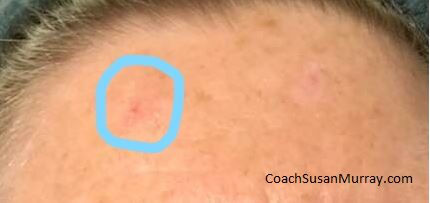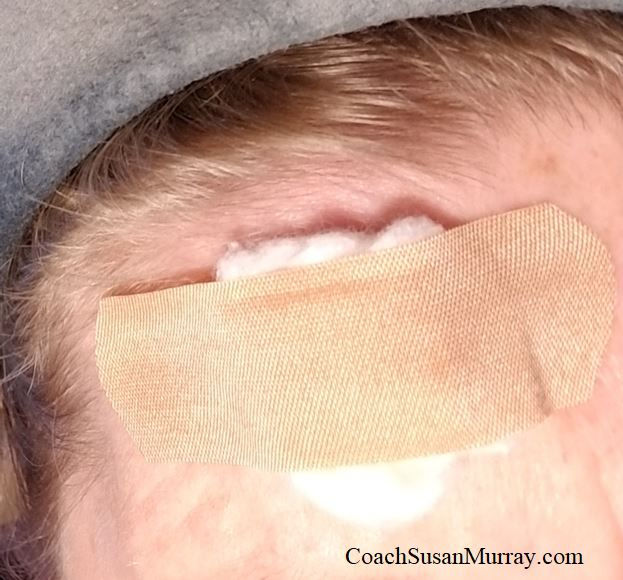Raw Apple Cider Vinegar and the Magically Disappearing Actinic Keratoses
- Mar 25, 2019
- 5 min read
Updated: Mar 20, 2020
Ready to grow ageless?
Book your free 15 minute Turn Back Time call today!
Raw Apple Cider Vinegar
and the Magically Disappearing
Actinic Keratoses
I remember a time when zits and blackheads were my most troubling skin conditions.
Now in my late fifties, time and sun overexposure have caught up with this fair-complexioned, blue-eyed blonde.
In my previous post I shared my experience with reversing Basal Cell Carcinoma with topical Ascorbic Acid, aka Vitamin C.
In this article I share how I reverse Actinic or Solar Keratoses with Raw Apple Cider Vinegar.
But first, a disclaimer:
Please remember that I am neither a medical doctor nor any other licensed medical professional. I do not diagnose, treat, or prescribe. I’m an educator and health investigator. I share what my investigation uncovers, as well as my personal experiences and observations. While I advocate health autonomy I also advocate personal responsibility and encourage anyone reading this to consult appropriate medical professionals in your process of determining your ideal healing approach. I do not recommend anyone taking the course of action I take, but I share my experience here to demonstrate an effective, safe, and affordable (if unorthodox) way of addressing actinic keratoses. Furthermore, I see my dermatologist every single year for a head to toe skin examination, and if I discover something that troubles me in between annual visits, I enjoy the luxury and privilege of having good insurance so that I can visit the dermatologist to have my concerns addressed.
Actinic What Now?
Actinic or Solar Keratoses are precancerous lesions typically caused by sunburns. "Actinic Keratosis" is the singular of this condition, but these small rough, scaly patches seldom are a one-off; if you've been diagnosed with one, you're likely to find more.
These spots can appear almost flat or slightly raised, and be pink, red, brown, or flesh colored. I typically feel the rough spots with my fingertips before I even see them. They are most commonly found on areas of the body that receive sun exposure, such as face, neck, chest, backs of hands, and forearms.

Actinic Keratosis (AK) is closely linked to the development of non-melanoma skin cancers, particularly Squamous Cell Carcinoma. Less frequently, Basal Cell Carcinoma can result from unaddressed AK.
If you have a fair complexion and red or blonde hair, sustained sunburns during your first 18 years of life, and can count more than 40 candles on your birthday cake, it's a good idea to recruit a dermatologist to help you keep an eye out for AK so you can address them when you find them.
As a side note, people of all ages and skin types who’ve received radiation treatments, even if they've never been sunburned, are at an increased risk of Actinic Keratoses and skin cancers in the areas radiotherapy was used.
The most common dermatological approach for removal of Actinic Keratosis is cryosurgery, aka cryotherapy[1] which uses liquid nitrogen or compressed nitrous oxide or carbon dioxide to freeze the lesions. I've had some AK spots removed by the dermatologist using this method, and likely will again if I think it is warranted.
According to a prospective study of the use of cryosurgery for the treatment of actinic keratoses[2], a cryotherapy treatment of 20 seconds had an 83% cure rate as opposed to a 5 second treatment, which produced a cure only 39% of the time.
Dermatologists may also prescribe topical chemotherapy agents to remove AK, though I have never gone that route and will do all I can to avoid it.[3]
I discovered by accident that Raw Apple Cider Vinegar can reverse AK.
I first learned about using raw apple cider vinegar (ACV) as a facial toner about 14 years ago.
Rich in pectin, potassium, malic acid, and various beneficial bacteria and enzymes as a result of natural fermentation, ACV possesses antiseptic, antibacterial, and antifungal properties which can balance the natural pH of the skin.
Best purchased in glass bottles to avoid leaching of plastic toxins, it's also an affordable, completely natural, nontoxic alternative to the chemical-laden facial toners on the market.
While using organic, undiluted, raw apple cider vinegar as a facial toner, I discovered that it can actually reveal patches of AK that I would not have otherwise seen.
With patches of AK revealed, I can then dab ACV on each spot 3-4 times a day until the patch falls away. For faster results, I fasten a cotton ball saturated with raw ACV with an adhesive bandage over the AK lesion before bed. Doing this, I typically see these spots gently resolve within two weeks.
Because ACV is astringent and drying to the skin, I seldom use it more than once a month on my face, neck, and chest unless any patches of AK are revealed, and then I go to work applying ACV on each spot that appears.
Fair warning: this stuff stings when used straight from the bottle! Still, I've found it very effective at identifying and removing AK safely without having to visit the dermatologist for a cryosurgery session every time I find a suspicious scaly patch. It's also far more comfortable than a 20 second blast of canned nitrogen!
Following this routine, I can stay on top of any of these precancerous spots and address them as I find them.
If using ACV as a skin tonic, it can be diluted with filtered water. I do not know if diluted ACV is as effective as full strength when reversing AK, so I will continue to use it straight from the bottle.

Unfortunately, while anecdotal reports are easy to find[4], no formal studies or clinical reports have been published to verify the ability of raw apple cider vinegar to reverse actinic keratosis.
If anecdotal evidence does not provide you the same level of security and confidence that a double-blind, placebo-controlled trial may, take a look at the study suggesting that oral doses of 500 mg nicotinimide/niacinamide[5], the non-flushing form of vitamin B3, aka Niacin, twice daily, can reverse and prevent actinic keratoses in addition to the two non-melanoma skin cancers, Basal Cell and Squamous Cell carcinomas.
The study found that after 1 year of taking a total of 1,000mg a day in divided doses of oral nicotinamide, patients at high risk for skin cancers "cut the rate of new squamous cell and basal cell skin cancers by 23% compared with placebo...Nicotinamide also reduced the risk for developing actinic keratosis, a common precancer of the skin." Furthermore, "Nicotinamide reduced the rates of actinic keratoses (precancers) by 11% at 3 months and by approximately 15% after 12 months of treatment compared with placebo."
That rate may sound low, but unlike other dermatological treatments for AK, nicotinamide has additional benefits of supplementation, and is a decidedly less risky intervention.[6]
Guess who’s adding 1,000 mg of nicotinamide to her daily supplement regimen?
Wishing you well,
Susan




I’ve used ACV to get rid of small warts on my wife’s forehead for the last couple of years - very successful. Now treating AK on my scalp and forehead, so far making good progress !